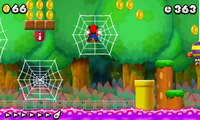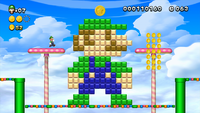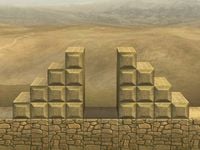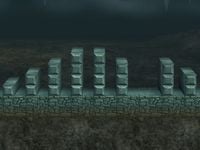Hard Block: Difference between revisions
| Line 92: | Line 92: | ||
===''Mario Clock''=== | ===''Mario Clock''=== | ||
In ''[[Mario Clock]]'', Hard Blocks appear using their ''Super Mario Bros.'' design as the terrain of the bridge stage theme | In ''[[Mario Clock]]'', Hard Blocks appear using their ''Super Mario Bros.'' design as the terrain of the bridge stage theme. | ||
===''Nintendo Badge Arcade''=== | ===''Nintendo Badge Arcade''=== | ||
Revision as of 07:08, November 17, 2020
It has been requested that this article be rewritten.
- Not to be confused with stone block.
A Hard Block is one of the many blocks in the Mario universe. They are most commonly used to make stairs that the player can climb. Unlike ? Blocks and Brick Blocks, Hard Blocks rarely contain anything. Mario and Luigi are not normally able to destroy Hard Blocks, but certain methods, such as turning Mega or having a Big Thwomp fall on them, can be used to destroy them.
History
Super Mario series
Super Mario Bros. / Super Mario Bros.: The Lost Levels
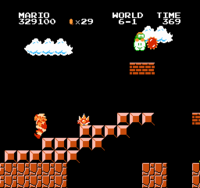
Hard Blocks made their debut in Super Mario Bros., and reappear in Super Mario Bros.: The Lost Levels with the exact same appearance and purpose. They are notable in both games for being used as stairs at the end of almost every non-castle level leading to the top of the flagpole, which itself has one as its base.
Super Mario Bros. 3
Hard Blocks also appear in Super Mario Bros. 3, where they are known as Wood Blocks.[1] Some Wood Blocks may contain an item, but they will not turn into an Empty Block after being hit. Wood Blocks will only ever yield items if they are hit from the side, and not from underneath. Mario or Luigi need only to press against the side of a Wood Block containing an item in order to reveal it, as opposed to having to use a Shell or a tail whip like with other types of blocks. Chain Chomps are always found attached to Wood Blocks. Larger versions of Wood Blocks appear in World 4, Giant Land.
In the GBA version, the Hard Blocks' original Super Mario Bros. design returns in the remakes of that game's Worlds 1-1, 1-2, and 2-2.
Super Mario World
Hard Blocks, called Gray Blocks[2], appear once again in Super Mario World with a different redesign, this time resembling blocks of stone.
New Super Mario Bros.
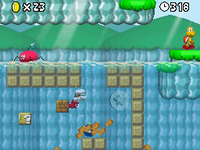
Hard Blocks have appeared in New Super Mario Bros. at the end of most levels like in Super Mario Bros., used for a staircase to reach the flagpole (which has a new fortress-styled base). If Mario gains a Mega Mushroom and turns into Mega Mario, he could destroy Hard Blocks simply by running into them. Volcanic debris can also destroy Hard Blocks.
New Super Mario Bros. Wii
Hard Blocks reappear in New Super Mario Bros. Wii, this time only appearing in World ![]() Coin-2.
Coin-2.
Super Mario 3D Land
Wood Blocks from Super Mario Bros. 3 return in the Nintendo 3DS game Super Mario 3D Land, where they are usually two times bigger (like those in Giant Land) and more yellow. Also, the Hard Blocks of Super Mario Bros. return at the ends of World 2-3 and Special 1-3.
New Super Mario Bros. 2
While wooden and stone Hard Blocks return, golden and colored Hard Blocks make their debut in New Super Mario Bros. 2. Pink, green, blue, orange, beige, brown, gold, black, light blue, red and yellow are the only known colors.
New Super Mario Bros. U / New Super Luigi U
Hard Blocks, referred to as stone blocks, returned in New Super Mario Bros. U. In addition, colored stone blocks return in New Super Luigi U, used mostly for decoration, or to make pixel art such as 8-bit Luigis, a common Easter egg in the game.
Super Mario Maker / Super Mario Maker for Nintendo 3DS
In Super Mario Maker and Super Mario Maker for Nintendo 3DS, all four designs of the Hard Blocks based on the four level styles appear. They can be destroyed by enemies, including Big Koopa Troopa shells, Big Thwomps, Bob-ombs, Magikoopas' magic attacks, Skewers, and Bowser. A new method of breaking Hard Blocks is firing a fully charged shot from a Fire Koopa Clown Car. They can also be destroyed by Big Mario.
Super Mario Maker 2
Hard Blocks also reappear in Super Mario Maker 2. They have the same mechanics as they did in Super Mario Maker, except they cannot be broken by Big Mario from the side. In version 2.0, Link was added into the game and his bombs can destroy Hard Blocks.
They take the form of Rock Blocks in the Super Mario 3D World style. While in that style, if the player uses the Super Hammer, they can break Hard Blocks with a hammer swing.
 This section is a stub. You can help the Super Mario Wiki by expanding it.
This section is a stub. You can help the Super Mario Wiki by expanding it.
Mario Kart series
Hard Blocks have appeared in the Mario Kart series as either regular Hard Blocks, or the colored Hard Blocks that border Mario Circuit.
Super Smash Bros. series
Super Mario Bros.-styled Hard Blocks appear throughout the Super Smash Bros. series.
The Mushroom Kingdom stage in Super Smash Bros. and the Mushroom Kingdom stage in Super Smash Bros. Melee feature the blocks' classic staircase arrangement in the background. The first one also had platforms made of Hard Blocks (Empty Blocks in Ultimate), though they were pass-through platforms.
In Super Smash Bros. Brawl, Super Smash Bros. for Nintendo 3DS, and Super Smash Bros. Ultimate, they appear as part of the Mushroomy Kingdom stage. They are arranged just as they were in World 1-1 (and in Brawl only, World 1-2) of Super Mario Bros. However, they now appear worn, chipped, and cracked, matching the stage's ruined appearance, and the block the flagpole stood on in World 1-1 is gone, but only in Brawl and for 3DS; it is in the background in Ultimate. Additionally, Hard Blocks also form the top two layers of the stage's Final Destination form in the 3DS game, and the Battlefield form's platforms in Ultimate.
Mario Clock
In Mario Clock, Hard Blocks appear using their Super Mario Bros. design as the terrain of the bridge stage theme.
Nintendo Badge Arcade
Hard Blocks also appear as badges in Nintendo Badge Arcade. The Super Mario Bros. Hard Blocks appear as part of the Super Mario Bros. set, while the Super Mario World ones appear as part of the Super Mario Maker set.
Gallery
Super Mario Bros. (underground)
Names in other languages
| Language | Name | Meaning | Notes |
|---|---|---|---|
| Japanese | 木目ブロック[3] Mokume Burokku 石ブロック[4] Ishi Burokku 硬いブロック Katai Burokku |
Woodgrain Block (Super Mario Bros. 3) Stone Block (New Super Mario Bros. games) Hard Block (Super Mario Maker 2) |
|
| Chinese (simplified) | 坚硬砖块[?] Jiānyìng Zhuānkuài |
Hard block | |
| Chinese (traditional) | 堅硬磚塊[?] Jiānyìng Zhuānkuài |
Hard block | |
| Dutch | Hard blok[?] | Hard Block | |
| Italian | Blocco duro[?] | Hard block | |
| Korean | 딱딱블록[?] Ttakttak Beullok |
Hard Block | |
| Russian | Прочный блок[?] Prochnyy blok |
Solid Block | |
| Spanish (NOA) | Bloque duro[?] | Hard block |
References
- ^ Peterson, Erik. Super Mario Advance 4: Super Mario Bros. 3 Player's Guide. Page 31.
- ^ Nintendo Mario Mania Player's Guide. Page 71.
- ^ Shogakukan. 2015. Super Mario Bros. Hyakka: Nintendo Kōshiki Guidebook, Super Mario Bros. 3 section, page 41.
- ^ Shogakukan. 2015. Super Mario Bros. Hyakka: Nintendo Kōshiki Guidebook, pages 118, 149, 199, 215.
- Blocks
- New Super Mario Bros. Objects
- New Super Mario Bros. 2 Objects
- New Super Mario Bros. U Objects
- Super Mario 3D Land Objects
- Super Mario Advance 4: Super Mario Bros. 3 Objects
- Super Mario Bros. Objects
- Super Mario Bros. 3 Objects
- Super Mario Bros.: The Lost Levels Objects
- Super Mario Maker Objects
- Super Mario Maker 2 Objects
- Super Mario World Objects
